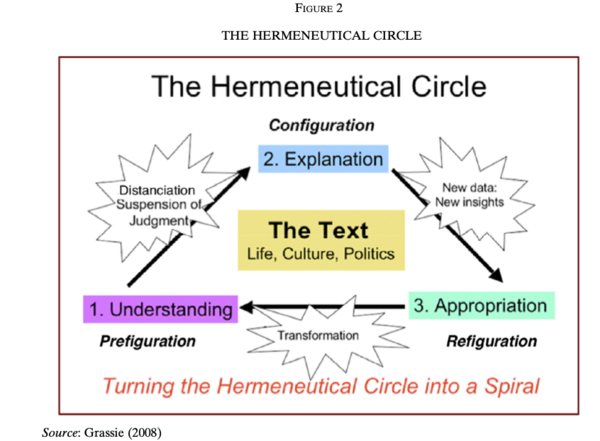Difference between revisions of "Hermeneutic Circle"
Jump to navigation
Jump to search
| (4 intermediate revisions by the same user not shown) | |||
| Line 1: | Line 1: | ||
{{WikiEntry|key=Hermeneutic circle|qCode=1570095}} | {{WikiEntry|key=Hermeneutic circle|qCode=1570095}} is the recursive structure that represent the iterative nature of interpretation. | ||
Note the three stages in the following diagram<ref>{{:Paper/The Life and Works of Luca Pacioli}}, Figure 2</ref>: | Note the three stages in the following diagram<ref>{{:Paper/The Life and Works of Luca Pacioli}}, Figure 2</ref>: | ||
# Configuration | # Configuration | ||
# | # Refiguration | ||
# Prefiguration | # Prefiguration | ||
[[File:HermeneuticalCircle.png| | [[File:HermeneuticalCircle.png|600px|thumb|center]] | ||
<noinclude> | |||
< | |||
= | {{PagePostfix | ||
|category_csd=Meta Mathematics,Abstract Interpretation,Learning Method | |||
}} | |||
</noinclude> | |||
Latest revision as of 06:00, 22 August 2022
Hermeneutic circle(Q1570095) is the recursive structure that represent the iterative nature of interpretation.
Note the three stages in the following diagram[1]:
- Configuration
- Refiguration
- Prefiguration
References
- ↑ Sangster, Alan (2021). "The Life and Works of Luca Pacioli (1446/7–1517), Humanist Educator". Abacus: A Journal of Accounting, Finance and Business Studies. local page: University of Sydney. 57. , Figure 2
Related Pages
